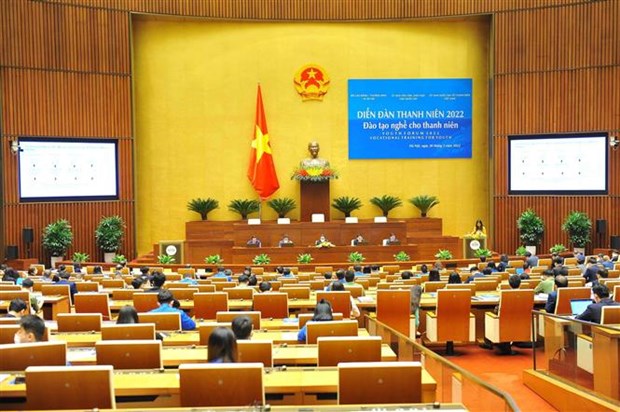
HÀ NỘI — The combination of COVID and the fourth Industrial Revolution has been disrupting the labour market and accelerating the process of job transition and vocational training.
Speaking at the ‘Youth Forum 2022: Vocational training for the Youth’ on Wednesday, First Secretary of the Central Committee of the Hồ Chí Minh Communist Youth Union (HCYU) Nguyễn Anh Tuấn said that the world is facing many unpredictable challenges and uncertainties which directly affect policy-making and the development of countries all over the world.
“Among the challenges, the strong impacts of the COVID-19 pandemic and the fourth Industrial Revolution can be considered ‘dual challenge’ for the global labour market,” he said.
According to the World Economic Forum (WEF), by 2025, about 85 million jobs will be removed worldwide, but 97 million new jobs will be created. To meet new requirements of the labour market, it is estimated that about half of workers will need to be retrained.
“Việt Nam is a country with a young population. The number of people of working age accounts for nearly 60 per cent of the population, in which the youth force plays a pivotal role,” Anh said.
The Youth Forum 2022 was co-organised by the National Assembly’s Committee for Culture and Education, the Ministry of Labour, Invalids and Social Affairs, and the National Committee for Youth. It follows the efforts and priorities of the National Assembly and the Government of Việt Nam in maintaining, restoring and promoting economic development.
Permanent Deputy Chairman of the NA Trần Thanh Mẫn said that the rate of young people with vocational skills accounted for only 19 per cent of the youth force, while the national average rate of trained workers was 24.1 per cent.
“The number of young people who have not received vocational training is still high, especially rural youths who do not have access to much information on vocational training, and opportunities to find jobs after training are still limited,” Mẫn said.
“The training structure is still unreasonable in terms of qualifications, professions, regions and youth psychology. Some occupations and skills of learners are not suitable or fail to meet employers’ requirements,” Mẫn said.
Due to the severe impact of the COVID-19 pandemic, many young people lost their jobs or had to change careers. The number of unemployed people of working age in 2021 is more than 1.4 million people, accounting for 3.22 per cent of working age people, an increase of 0.54 percentage point compared to 2020.
Meanwhile, the fourth Industrial Revolution and its many technological breakthroughs has already led to labour restructuring as automatic systems gradually replace manual labour, affecting the employment of skilled workers, he said.
Mẫn suggested that the agencies of the National Assembly, the Government, ministries, central branches and localities study and come up with effective solutions, turning ideas into specific actions to improve the quality of human resources, labour productivity, promoting economic growth and national competitiveness.
“We continue to closely coordinate, implement and supervise the implementation of programmes on vocational training for youth,” he said, adding that agencies were studying, proposing and recommending to the National Assembly and the Government to promulgate timely solutions to remove difficulties for young people.
Head of Institute of Educational Sciences and Economic Management Mạc Văn Tiến said that youth unions have implemented effective models on job training for young people. The models should be expanded, he said, adding that in the context of the Industry 4.0, the role of business was essential in creating jobs for young people.
“The Youth Union and the General Department of Vocational Education and Training need to cooperate to provide vocational training, so that young workers should not return to informal employment. This is a challenge for our country’s labour market,” Tiến said.
Chairman of the NA’s Culture and Education Committee Nguyễn Đắc Vinh said that youth was a key force in the national construction and defence, as well as the implementation of a strategy for rapid and sustainable development of the country in the new period.
“Vocational training for young people should be considered as one of the focus of the whole education-training system at all levels and forms of training, not just the task of the vocational education system alone,” Vinh said.
“There is a gap in the orientation of vocational training and career counselling between the training system and the actual demand for human resources of the socio-economic development, between learners’ desire and employers’ requirements,” he said.
Now it’s time to solve problems to ensure human resources supply for socio-economic recovery after the COVID-19 pandemic and create a long-term strategy on human resources – a driving force for the country’s development in the coming years, he said. — VnExpress News
- Reduce Hair Loss with PURA D’OR Gold Label Shampoo
- Castor Oil Has Made a “Huge” Difference With Hair and Brow Growth
- Excessive hair loss in men: Signs of illness that cannot be subjective
- Dịch Vụ SEO Website ở Los Angeles, CA: đưa trang web doanh nghiệp bạn lên top Google
- Nails Salon Sierra Madre
 VnExpress News The News Gateway of Vietnam
VnExpress News The News Gateway of Vietnam





